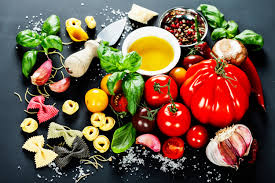The Mediterranean cuisine, although the concept it relatively new, it nevertheless, has a vast history, and is becoming increasingly popular all around the world.
Mediterranean cuisine, unlike other traditional cuisines, doesn’t only refer to one country, culture or ethnicity however, refers to the region of countries one can find in the south of Europe; near the Mediterranean Sea.
This cuisine is the result of globalisation; multiple cultures exchanging and introducing products to different cultures, like spices or herbs, causing them to be distributed, and influence different cultures all around the Mediterranean. Furthermore, many countries near and surrounding the Mediterranean having direct contact, this would cause the governments of different nationalities to over throw each other, which would lead to the cultures and traditions of the winning government, to mix with the traditions and cultures of original people from the respective country. The Mediterranean climate; warm summers, wet winters, also encouraged this cuisine, seeing as it is a plant-based one, this climate was excellent for providing exceptional growing grounds for plants used in this dish, which included, whole grain, olive oil, nuts, and seeds. The discovery of America, further introduced healthy recipes, with the introduction of the tomato.
One of the most prevalent ingredient in the Mediterranean cuisine is olive oil. Olive trees are widespread throughout the region, and this smooth and buttery oil is major export of the majority of the Mediterranean countries. The Palacio de Congresos in Torremolinos is the biggest showcase for Olive Oil suppliers in Andalucia and Spain. During this event there will be exhibitions, tastings, products for sale as well as cooking workshops for children. And last but not least, there’s always a lot of debates on health and gastronomy. Olive oil has been one of the most important sources of income for many civilisations throughout history, especially in the East Mediterranean.
However, even though the build-up to this cuisine has taken thousands of years, as stated before, the concept is relatively new. What unfolded the creation of this cuisine was probably, the publication of Elizabeth David’s book; ‘A Book of Mediterranean Food’, which only dates back to the 1950s. Nonetheless, even if the concept is new, the popularity of this food has increased drastically and nowadays, it is extremely well known and beloved by millions.
The widespread popularity of this food is probably due to many things. Yet, it is probably mainly due to the fact that, it is healthy and has great taste.
Unfortunately, the typical Mediterranean cuisine is high in animal fats and sugars but can at times be low in fruit and vegetables. Scientific research has shown that such combination is responsible for many chronic diseases and cancers.
On the other hand, research has also shown that Mediterranean cuisine can reduce the chance of developing conditions such as heart disease, high blood pressure, obesity, some cancers and Alzheimer’s disease.
Due to the multiple ethnicities that helped build this cuisine, there is also a huge variety of possible meals one could create, which would be rich in flavour and have a common healthful heritage. Due to many chefs and food experts, adoring the Mediterranean cuisine, they have also helped to influence people all around the world and promote it globally. This type of food has also been encouraged throughout the world, due to the healthy characteristics it holds, allowing many with eating disorders to devour it, remain healthy, whilst eating something that contains tons of flavour. This type of food is not hard to prepare, and is not that costly to buy, this point has also helped increase the popularity of the dish.
One thing for sure is that Mediterranean Diet is not about quick fix super foods. Nor it is about a list of foods to avoid or not to eat. A Mediterranean diet is about a healthy day-to-day eating over the long term. Here are some delicious Mediterranean recipes.These are some tips for a healthier Mediterranean diet:
- Maximise your intake of vegetables, peas and beans, fruits and wholegrain cereals.
- Limit your red meat intake – fish and poultry are healthier substitutes.
- Where possible, use olive oil instead of butter or lard.
- Limit your intake of highly processed fast foods and ready meals.
- Eat no more than moderate amounts of dairy products and preferably low-fat ones.
- Do not add salt to your food at the table – there is already plenty in the food.
- Snack on fruit, dried fruit and unsalted nuts rather than cakes, crisps and biscuits.
- Drink wine, especially red, during meals but no more than two small glasses per day.
- Water is the best ‘non-alcoholic beverage’
The Mediterranean cuisine, continues to expand in recipes and in popularity. It is the perfect meal for food-lovers, who want to keep a healthy lifestyle. If you are a person who has never tried this type of meal before, I highly recommend you do as soon as possible. If you would like to learn more about the benefits of a Mediterranean diet we invite you to visit this article.

